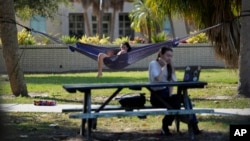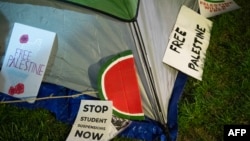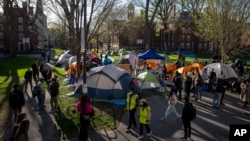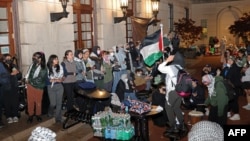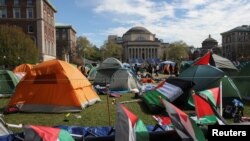Student Union
International students share diverse views on 2024 US elections
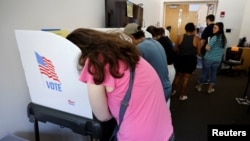
International students in the United States are observing the 2024 presidential election with a mix of curiosity and concern, highlighting the global interest of American politics in the rest of the world.
When speaking with some current and former international students who have witnessed several U.S. presidential election campaigns, they were drawn to the openness of discussions and the amount of information available about the process.
They appreciate the high level of engagement and transparency in the electoral process, which stands in stark contrast to the more restricted political environments in their home countries. Their diverse feedback highlights the global interest in and impact of American politics.
Musbah Shaheen, a native of Syria, arrived in the U.S. in 2014 for undergraduate studies at Vanderbilt University. Now an assistant professor at the University of Massachusetts Amherst, Shaheen said he initially found the political landscape confusing.
“The first U.S. election I experienced was in 2016. At the time, I didn’t even realize I was experiencing an election in the same way I did in 2020,” he said. “My interaction with the political system in the [United] States has been an eye-opening experience.”
In Syria, political discussions were often avoided, he said, adding that, “Politics was taboo. Family gatherings involved hushed conversations with windows closed and voices lowered.”
This contrasted sharply with the open political discourse he encountered in the U.S.
“In the United States, people sometimes feel like their voice doesn’t matter, but I have experienced actual fear of vocalizing what I believed. This country does feel like there is room for conversation and debate in a way that I didn’t really get when I was in Syria,” Shaheen said.
Now a faculty member, Shaheen emphasizes guiding students through ideological differences.
“I want my students to understand not just the policies but the ideologies behind them,” he said. “What does it mean to be conservative or liberal? What are the foundational beliefs of these ideologies?”
Shaheen emphasized the need to create both physical and emotional spaces where students can freely discuss topics like U.S. politics. Moreover, Shaheen calls for increased intellectual engagement.
“We need to encourage all students, international and domestic, to reflect on their beliefs and engage in meaningful conversations. We don’t want siloed resources for our students; we want them to engage with a variety of ideas,” he explained.
Rohan Naval, from Bengaluru, India, and a political science student at American University in Washington, offers a different perspective.
Naval, who has been studying in the U.S. for a year, mentioned being impressed by the extensive media coverage of U.S. elections.
“From a student’s perspective, I like the way U.S. elections are conducted. There’s a lot of media coverage, and efforts to get voters registered and informed are commendable,” he said.
Naval expressed surprise at the unpredictability of the current U.S. campaign.
“Everything we’ve seen over the last two months has been very surprising, like the assassination attempt on Donald Trump. It’s hard to predict what will happen next,” he said.
He was particularly surprised by President Joe Biden’s decision to drop out of the race after participating in just one debate.
Naval, who grew up in India, compared U.S. and Indian elections, noting the convenience of mail-in ballots in the U.S. and the transparency in the counting process.
“In India, voters often have to travel long distances to cast their ballots, whereas in the U.S., the process is more accessible,” he said.
Victoria Charalampidi, a recent graduate from the American College of Greece where she majored in communication with a minor in international affairs, had studied in the U.S. in 2022 at Loyola University in Baltimore, Maryland.
“When I arrived, Joe Biden was president. I viewed his presidency as a shift away from Trump’s administration,” she said.
She noted that Trump’s economic policies had some positive effects, but she thought his approach to politics was often more divisive compared to Biden's approach during his candidacy.
Charalampidi said she found the complexity of governing a diverse nation intriguing.
She said she is disappointed with the current political campaigns in the U.S., which she said seems more polarized.
“The focus on military engagements and the rollback of policies like abortion rights show a country struggling to move forward while clinging to old values,” Charalampidi said.
She also says the campaign of Vice President Kamala Harris, the Democratic presidential nominee, represents progress as a woman of color is competing for high office.
As international students navigate the complexities of U.S. elections, their insights offer a valuable perspective on the global impact of American politics.
- By VOA News
International students have options to pay for grad school
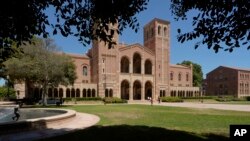
U.S. News & World Report tackles the challenges of paying for grad school as an international student with this story giving tips on paying for school. Read the full story here. (August 2024)
- By Tracy Liu
Economics, tensions blamed for Chinese students shifting from US to Australia, Britain
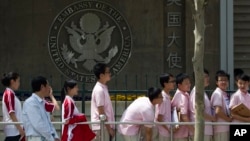
U.S. universities are welcoming international students as the academic year begins. But while the total number of foreign students is steadily growing, the top sending country, China, is showing signs of leveling out or shrinking.
Industry analysts say the negative trend is mainly due to higher costs amid China’s struggling economy, with a growing number of students going to less expensive countries like Australia and Britain, and tense ties between Washington and Beijing.
The number of foreign students studying in the U.S. in 2022-23 passed 1 million for the first time since the COVID pandemic, said Open Doors, an information resource on international students and scholars.
While the U.S. saw a nearly 12% total increase year-on-year for that period, the number of international students from China, its top source, fell by 0.2% to 289,526.
That’s 600 fewer students than the 2021-22 academic year, when their numbers dropped by nearly 9%. The COVID pandemic saw Chinese student numbers drop in 2020-21 by nearly 15%, in line with the world total drop.
While it’s not yet clear if the drop is a leveling out or a fluctuating decline, analysts say China’s struggling economy and the high cost of studying in the U.S. are the main reasons for the fall in student numbers.
Vincent Chen, a Chinese study abroad consultant based in Shanghai, said although most of his clients are still interested in studying in the U.S., there is a clear downward trend, while applicants for Anglophone universities in Australia and Britain have been increasing.
"If you just want to go abroad, a one-year master's degree in the U.K. is much cheaper,” Chen said. “Many people can't afford to study in the U.S., so they have to settle for the next best thing."
Data from the nonprofit U.S. group College Board Research shows that in the 2023-24 academic year, the average tuition and fees for a U.S. private college four-year education increased 4% to $41,540 compared with the previous academic year.
The British Council said three to four years of undergraduate tuition in Britain starts as low as $15,000.
The number of Chinese students in Britain was 154,260 in 2022-23, according to the U.K. Higher Education Statistics Agency, HESA, up from 121,145 in the 2018/19 academic year.
Australia’s Home Affairs office said in the 2023-24 program year, China was the top source foreign country for new student visa grants at 43,389, up slightly (1.5%) from the previous year.
Chen said Chinese state media's negative portrayal of the United States and concerns about discrimination have also contributed to the shift.
Bruce Zhang, a Chinese citizen who received his master's degree in Europe after studying in China, told VOA Mandarin he had such an incident occur to him after he was admitted to a U.S. university’s Ph.D. program.
When he entered Boston's Logan International Airport last year, Zhang said customs officers questioned him for more than an hour about his research, and if it had any links to the military, and took his computer and mobile phone for examination.
"Fortunately, I had heard that U.S. customs might be stringent in inspecting Chinese students, so I had relatively few study-related data and documents on my personal computer," he said.
Zhang was allowed to enter the U.S. for his studies in materials science, but the questioning left him so rattled that he has encouraged other Chinese to study elsewhere.
Cui Kai, a study abroad consultant in Massachusetts told VOA Mandarin that experiences like Zhang’s or worse happen for a reason.
"Students who were questioned or their visas were revoked at the customs are usually those who completed their undergraduate studies in China and come to the U.S. for a master's or doctoral degree in a sensitive major," said Cui.
Former President Donald Trump signed Proclamation 10043 in June 2020, prohibiting visas for any Chinese student who “has been employed by, studied at, or conducted research at or on behalf of, an entity in the PRC that implements or supports the PRC's “military-civil fusion strategy.”
The U.S. says China has been using students and scholars to gain access to key technology and, under Proclamation 10043, revoked more than 1,000 visas issued to Chinese nationals and has denied thousands more.
Critics say the policy is costly to the U.S. and is encouraging Chinese students to look to European and other universities.
Adrianna Zhang contributed to this report.
- By VOA News
Duolingo report details the reality of Gen Z international students
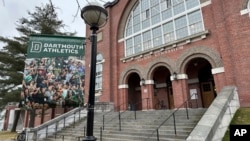
A report by Duolingo takes a look at the experiences of Gen Z international students studying in the U.S., Australia and the U.K, The Pie reports.
The report, the site says, debunks "characterizations of them as 'tech-obsessed, attention-deficit and self-centered'" and highlights "their emerging role in shaping global politics and economics."
Read the full story here. (August 2024)
- By VOA News
School with the lowest costs for international students

U.S. News & World Report crunched the numbers and came up with a list of 20 U.S. colleges and universities with annual total costs at or below $20,184. Check out these best bargains for international students here. (August 2024)
- By VOA News
How to make the most of schools' international student services
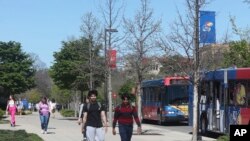
U.S. colleges and universities offer a variety of services for international students.
U.S. News & World Report takes a look at them and details how to best use them. Read the article here. (June 2024)
- By VOA News
Got a student visa? Here's how to maintain that status

Getting a student visa to study in the United States takes time and planning. So does keeping it.
U.S. News & World Report details what international students need to know about maintaining their F-1 or J-1 visa status. Read the story here. (June 2024)
- By VOA News
India Today's top US colleges for international students
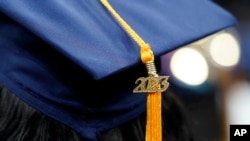
India Today has a rundown on its top five U.S. colleges for international students.
Think it's all about the Ivy League? Guess again. Get the list here. (June 2024)
- By Reuters
MIT's enrollment of Black, Latino students drops after affirmative action ban

The Massachusetts Institute of Technology's incoming freshman class this year dropped to just 16% Black, Hispanic, Native American or Pacific Islander students compared to 31% in previous years after the U.S. Supreme Court banned colleges from using race as a factor in admissions in 2023, the elite engineering school said.
The proportion of Asian American students in the incoming class rose from 41% to 47%, while white students made up about the same share of the class as in recent years.
MIT administrators said the statistics are the result of the Supreme Court's decision last year to ban affirmative action, a practice that many selective U.S. colleges and universities used for decades to boost enrollment of underrepresented minority groups.
Harvard and the University of North Carolina, the defendants in the Supreme Court case, argued that they wanted to promote diversity to offer educational opportunities broadly and bring a range of perspectives to their campuses. The conservative-leaning Court ruled that their race-conscious admissions practices violated the U.S. Constitution's promise of equal protection under the law.
"The class is, as always, outstanding across multiple dimensions," MIT President Sally Kornbluth said in a statement about the Class of 2028.
"But what it does not bring, as a consequence of last year’s Supreme Court decision, is the same degree of broad racial and ethnic diversity that the MIT community has worked together to achieve over the past several decades."
This year's freshman class at MIT is 5% Black, 1% American Indian/Alaskan Native, 11% Hispanic and 0% Native Hawaiian/Pacific Islander. It is 47% Asian American and 37% white. (Some students identified as more than one racial group).
By comparison, the past four years of incoming freshmen were a combined 13% Black, 2% American Indian/Alaskan Native, 15% Hispanic and 1% Native Hawaiian/Pacific Islander. The previous four classes were 41% Asian American and 38% white.
U.S. college administrators revamped their recruitment and admissions strategies to comply with the court ruling and try to keep historically marginalized groups in their applicant and admit pool.
Kornbluth said MIT's efforts had apparently not been effective enough, and going forward the school would better advertise its generous financial aid and invest in expanding access to science and math education for young students across the country to mitigate their enrollment gaps.
California announces new deal with tech to fund journalism, AI research

California will be the first U.S. state to direct millions of dollars from taxpayer money and tech companies to help pay for journalism and AI research under a new deal announced Wednesday.
Under the first-in-the-nation agreement, the state and tech companies would collectively pay roughly $250 million over five years to support California-based news organization and create an AI research program. The initiatives are set to kick in in 2025 with $100 million the first year, and the majority of the money would go to news organizations, said Democratic Assemblymember Buffy Wicks, who brokered the deal.
"This agreement represents a major breakthrough in ensuring the survival of newsrooms and bolstering local journalism across California — leveraging substantial tech industry resources without imposing new taxes on Californians," Gov. Gavin Newsom said in a statement. "The deal not only provides funding to support hundreds of new journalists but helps rebuild a robust and dynamic California press corps for years to come, reinforcing the vital role of journalism in our democracy."
Wicks' office didn't immediately answer questions about specifics on how much funding would come from the state, which news organizations would be eligible and how much money would go to the AI research program.
The deal effectively marks the end of a yearlong fight between tech giants and lawmakers over Wicks' proposal to require companies like Google, Facebook and Microsoft to pay a certain percentage of advertising revenue to media companies for linking to their content.
The bill, modelled after a legislation in Canada aiming at providing financial help to local news organizations, faced intense backlash from the tech industry, which launched ads over the summer to attack the bill. Google also tried to pressure lawmakers to drop the bill by temporarily removing news websites from some people's search results in April.
"This partnership represents a cross-sector commitment to supporting a free and vibrant press, empowering local news outlets up and down the state to continue in their essential work," Wicks said in a statement. "This is just the beginning."
California has tried different ways to stop the loss of journalism jobs, which have been disappearing rapidly as legacy media companies have struggled to profit in the digital age. More than 2,500 newspapers have closed in the U.S. since 2005, according to Northwestern University's Medill School of Journalism. California has lost more than 100 news organizations in the past decade, according to Wicks' office.
The Wednesday agreement is supported by California News Publishers Association, which represents more than 700 news organizations, Google's corporate parent Alphabet and OpenAI. But journalists, including those in Media Guild of the West, slammed the deal and said it would hurt California news organizations.
State Sen. Steve Glazer, who authored a bill to provide news organizations a tax credit for hiring full-time journalists, said the agreement "seriously undercuts our work toward a long-term solution to rescue independent journalism."
State Senate President Pro Tempore Mike McGuire also said the deal doesn't go far enough to address the dire situation in California.
"Newsrooms have been hollowed out across this state while tech platforms have seen multi-billion-dollar profits," he said in a statement. "We have concerns that this proposal lacks sufficient funding for newspapers and local media and doesn't fully address the inequities facing the industry."
Discarded gender and diversity books trigger new culture clash at Florida college
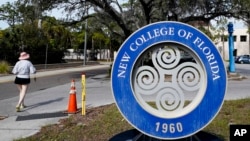
When hundreds of books got hauled away in a dumpster from the library of the New College of Florida on Thursday, the tiny liberal arts college with a governing board dominated by appointees of Republican Gov. Ron DeSantis once again found itself at the center of the state's culture wars.
"We abolished the gender studies program. Now we're throwing out the trash," Christopher Rufo, a DeSantis appointee to the Sarasota college's governing board, posted Friday on X, formerly Twitter.
The American Civil Liberties Union, meanwhile, condemned the college for "a brazen act of censorship."
"These actions are nothing short of a cultural purge, reminiscent of some of history's darkest times, where regimes sought to control thought by burning books and erasing knowledge," Bacardi Jackson, executive director of the ACLU of Florida, said in a statement.
Both sides were responding to accounts spread through social media that officials at the campus of roughly 700 students had sent a large collection of books from the college's recently shuttered gender studies program to a local landfill.
But a statement by New College administrators said people were confusing two different batches of books. It said volumes taken away by dumpster came from a routine culling of the main library's collection, largely to get rid of old and damaged books. Books related to gender studies, it said, were also placed outside the library and "were later claimed by individuals planning to donate the books locally."
A student who alerted classmates to the book dumping told The Associated Press that she saw two large boxes filled with books Thursday at the campus' student-run Gender and Diversity Center, located in a building where staff were busy moving furniture, repainting and otherwise preparing for students to return to campus next week.
Natalia Benavides said those boxes got moved to the library parking lot near the dumpster, but fellow students and activists responding to her alert managed to save most of the Gender and Diversity Center's books before they got thrown away.
"Primarily what was in the dumpster were library books —- they were stamped with 'discard' and they were bound so that you knew they were from the library," said Benavides, a fourth-year student. "They seemed to be of every topic under the sun: art history books, books on aesthetics, psychology books."
It's not surprising that discarding books would trigger controversy at New College. Known for decades as a progressive school with a prominent LGTQ+ community, the campus became a target for DeSantis and as war on "woke." In early 2023, the governor overhauled the college's Board of Trustees by installing a majority of conservative members.
The new trustees promptly fired the college president and replaced her with a Republican politician. Several other administrators also lost their jobs. The board dismantled the office of diversity and equity and a year ago voted to shut down the campus' gender studies program.
"Every couple of months, they have destroyed some part of this campus whether it is physical spaces or our books," said Amy Reid, the professor who led the college's gender studies program and now plans a yearlong leave of absence.
Reid said she believes books were removed from the Gender and Diversity Center, a student-run office that was independent of the academic gender studies program, because it's also being shuttered. She said the center's sign was also taken down and that it had housed more than two boxes of books, many of which she suspects ended up in the trash.
"Was I surprised that this happened?" Reid said. "No, because we've seen an effort to refashion this campus and make it unwelcoming."
New College's statement said only that books "associated with the discontinued Gender Studies program" had been removed from a room "that is being repurposed." A college spokesperson, Nate March, declined to to answer further questions.
Zander Moricz, who leads a group of student activists called the SEE Alliance, said books from the Gender and Diversity Center that were nearly thrown out included volumes on slavery, a collection of Jewish stories and three copies of the Bible.
Campus police prevented students from retrieving books from the dumpster, he said, which was loaded onto a truck that members of his group followed to a local landfill.
"The vast majority of the books were 100% readable and in good condition," Moricz said.
The American Library Association encourages academic libraries to cull books in poor physical condition or no longer deemed accurate or relevant — though its guidelines say books should never be removed because they're controversial.
Association spokesperson Jean Hodges said it's up to individual libraries what to do with removed books.
"Donation, recycling, resale, and disposal all fall within normal practice," Hodges said by email.
US colleges revise rules on free speech in hopes of containing anti-war demonstrations
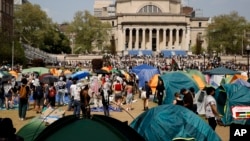
As students return to colleges across the United States, administrators are bracing for a resurgence in activism against the war in Gaza, and some schools are adopting rules to limit the kind of protests that swept campuses last spring.
While the summer break provided a respite in student demonstrations against the Israel-Hamas war, it also gave both student protesters and higher education officials a chance to regroup and strategize for the fall semester.
The stakes remain high. At Columbia University, President Minouche Shafik resigned Wednesday after coming under heavy scrutiny for her handling of the demonstrations at the campus in New York City, where the wave of pro-Palestinian tent encampments began last spring.
Some of the new rules imposed by universities include banning encampments, limiting the duration of demonstrations, allowing protests only in designated spaces and restricting campus access to those with university identification. Critics say some of the measures will curtail free speech.
The American Association of University Professors issued a statement Wednesday condemning “overly restrictive policies” that could discourage free expression. Many of the new policies require protesters to register well in advance and strictly limit the locations where gatherings can be held, as well as setting new limits on the use of amplified sound and signage.
“Our colleges and universities should encourage, not suppress, open and vigorous dialogue and debate even on the most deeply held beliefs,” said the statement, adding that many policies were imposed without faculty input.
The University of Pennsylvania has outlined new “temporary guidelines” for student protests that include bans on encampments, overnight demonstrations, and the use of bullhorns and speakers until after 5 p.m. on class days. Penn also requires that posters and banners be removed within two weeks of going up. The university says it remains committed to freedom of speech and lawful assembly.
At Indiana University, protests after 11 p.m. are forbidden under a new “expressive activities policy” that took effect August 1. The policy says “camping” and erecting any type of shelter are prohibited on campus, and signs cannot be displayed on university property without prior approval.
The University of South Florida now requires approval for tents, canopies, banners, signs and amplifiers. The school’s “speech, expression and assembly” rules stipulate that no “activity,” including protests or demonstrations, is allowed after 5 p.m. on weekdays or during weekends and not allowed at all during the last two weeks of a semester.
A draft document obtained over the summer by the student newspaper at Harvard University showed the college was considering prohibitions on overnight camping, chalk messages and unapproved signs.
“I think right now we are seeing a resurgence of repression on campuses that we haven’t seen since the late 1960s,” said Risa Lieberwitz, a Cornell University professor of labor and employment law who serves as general counsel for the AAUP.
Universities say they encourage free speech as long as it doesn’t interfere with learning, and they insist they are simply updating existing rules for demonstrations to protect campus safety.
Tensions have run high on college campuses since the October 7 Hamas terror attack in southern Israel killed 1,200 people, most of them civilians, and took about 250 hostages.
Many student protesters in the U.S. vow to continue their activism, which has been fueled by Gaza’s rising death toll, which surpassed 40,000 on Thursday, according to the territory’s Health Ministry.
About 50 Columbia students still face discipline over last spring’s demonstrations after a mediation process that began earlier in the summer stalled, according to Mahmoud Khalil, a lead negotiator working on behalf of Columbia student protesters. He blamed the impasse on Columbia administrators.
“The university loves to appear that they’re in dialogue with the students. But these are all fake steps meant to assure the donor community and their political class,” said Khalil, a graduate student at Columbia’s School of International and Public Affairs.
The university did not immediately respond to a request for comment Thursday.
The Ivy League school in upper Manhattan was roiled earlier this year by student demonstrations, culminating in scenes of police officers with zip ties and riot shields storming a building occupied by pro-Palestinian protesters.
Similar protests swept college campuses nationwide, with many leading to violent clashes with police and more than 3,000 arrests. Many of the students who were arrested during police crackdowns have had their charges dismissed, but some are still waiting to learn what prosecutors decide. Many have faced fallout in their academic careers, including suspensions, withheld diplomas and other forms of discipline.
Shafik was among the university leaders who were called for questioning before Congress. She was heavily criticized by Republicans who accused her of not doing enough to combat concerns about antisemitism on the Columbia campus.
She announced her resignation in an emailed letter to the university community just weeks before the start of classes on September 3. The university on Monday began restricting campus access to people with Columbia IDs and registered guests, saying it wanted to curb “potential disruptions” as the new semester draws near.
“This period has taken a considerable toll on my family, as it has for others in the community,” Shafik wrote in her letter. “Over the summer, I have been able to reflect and have decided that my moving on at this point would best enable Columbia to traverse the challenges ahead.”
Pro-Palestinian protesters first set up tent encampments on Columbia’s campus during Shafik’s congressional testimony in mid-April, when she denounced antisemitism but faced criticism for how she responded to faculty and students accused of bias.
The school sent in police to clear the tents the following day, only for the students to return and inspire a wave of similar protests at campuses across the country as students called for schools to cut financial ties with Israel and companies supporting the war.
The campus was mostly quiet this summer, but a conservative news outlet in June published images of what it said were text messages exchanged by administrators while attending a May 31 panel discussion titled “Jewish Life on Campus: Past, Present and Future.”
The officials were removed from their posts, with Shafik saying in a July 8 letter to the school community that the messages were unprofessional and “disturbingly touched on ancient antisemitic tropes.”
Other prominent Ivy League leaders have stepped down in recent months, largely because of their response to the volatile protests on campus.
University of Pennsylvania President Liz Magill resigned in December after less than two years on the job. She faced pressure from donors and criticism over testimony at a congressional hearing where she was unable to say under repeated questioning that calls on campus for the genocide of Jews would violate the school’s conduct policy.
And in January, Harvard University President Claudine Gay resigned amid plagiarism accusations and similar criticism over her testimony before Congress.
Columbia's president resigns after months of turmoil, including Gaza protests
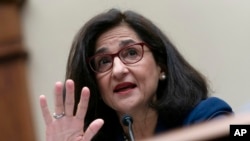
Columbia University President Minouche Shafik resigned Wednesday after a brief, tumultuous tenure that saw the head of the prestigious New York university grapple with protests over the Israel-Hamas war and criticism over how the school handled divisions related to the conflict.
The school in upper Manhattan was roiled this year by student protests, culminating in scenes of police officers carrying zip ties and riot shields storming a building that had been occupied by pro-Palestinian protesters. Similar protests swept college campuses nationwide.
In addition to the protests, the school in July removed three deans, who have since resigned, after officials said they exchanged disparaging texts during a campus discussion about Jewish life and antisemitism. Shafik said in a July 8 letter to the school community that the messages were unprofessional and "disturbingly touched on ancient antisemitic tropes."
Shafik was also among the university leaders called for questioning before Congress earlier this year. She was heavily criticized by Republicans who accused her of not doing enough to combat concerns about antisemitism on Columbia's campus.
In her letter announcing her resignation, Shafik heralded "progress in a number of important areas" but lamented that her tenure had also been a "period of turmoil where it has been difficult to overcome divergent views across our community." In her statement, she acknowledged the campus protests factored into her decision to resign.
"This period has taken a considerable toll on my family, as it has for others in the community," Shafik wrote. "Over the summer, I have been able to reflect and have decided that my moving on at this point would best enable Columbia to traverse the challenges ahead."
Shafik said she will return to the United Kingdom to lead an effort by the foreign secretary's office reviewing the government's approach to international development and how to improve capability.
"I am very pleased and appreciative that this will afford me the opportunity to return to work on fighting global poverty and promoting sustainable development, areas of lifelong interest to me," she wrote. "It also enables me to return to the House of Lords to reengage with the important legislative agenda put forth by the new UK government."
The Board of Trustees announced that Katrina Armstrong, the CEO of Columbia University Irving Medical Center, agreed to serve as interim president. The board said Armstrong, who is also the executive vice president for the university's Health and Biomedical Sciences, "is the right leader for this moment."
Armstrong said she was "deeply honored" to be leading the university at a "pivotal moment for Columbia."
"Challenging times present both the opportunity and the responsibility for serious leadership to emerge from every group and individual within a community," Armstrong wrote. "This is such a time at Columbia. As I step into this role, I am acutely aware of the trials the University has faced over the past year."
Shafik was named president of the university last year and was the first woman to take on the role, and she was one of several women newly appointed to take the reins at Ivy League institutions.
She had previously led the London School of Economics and before that worked at the World Bank, where she rose through the ranks to become the bank's youngest-ever vice president. Shafik also worked at the United Kingdom's Department for International Development, followed by stints at the International Monetary Fund and the Bank of England.
At the time of Shafik's appointment, Columbia Board of Trustees chair Jonathan Lavine described her as a leader who deeply understood "the academy and the world beyond it."
"What set Minouche apart as a candidate," Lavine had said in a statement, "is her unshakable confidence in the vital role institutions of higher education can and must play in solving the world's most complex problems."
Universities consider strategies after DEI, affirmative action eliminated
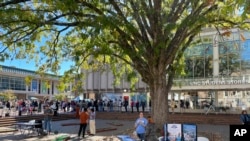
With affirmative action programs banned and diversity, equity and inclusion programs increasingly targeted, U.S. colleges and universities are looking at other ways to support minority students and staff.
Paul Baskin writes in Times Higher Education about the move to eliminate DEI, and how colleges are coping. (August 2024)
Former N.Y. state collegian jailed for posting threats to Jewish students
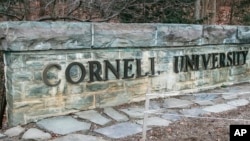
A former Cornell University student arrested for posting statements threatening violence against Jewish people on campus last fall after the start of the war in Gaza was sentenced Monday to 21 months in prison.
Patrick Dai, of suburban Rochester, New York, was accused by federal officials in October of posting anonymous threats to shoot and stab Jewish people on a Greek life forum. The threats came during a spike in antisemitic and anti-Muslim rhetoric related to the war and rattled Jewish students on the upstate New York campus.
Dai pleaded guilty in April of posting threats to kill or injure another person using interstate communications.
He was sentenced in federal court to 21 months in prison and three years of supervised release by Judge Brenda Sannes, according to federal prosecutors. The judge said Dai “substantially disrupted campus activity” and committed a hate crime, but noted his diagnosis of autism, his mental health struggles and his nonviolent history, according to cnycentral.com.
Dai, 22, had faced a possible maximum sentence of five years in prison.
“Every student has the right to pursue their education without fear of violence based on who they are, how they look, where they are from or how they worship,” Assistant Attorney General Kristen Clarke of the Justice Department’s Civil Rights Division said in a news release. “Antisemitic threats of violence, like the defendant’s vicious and graphic threats here, violate that right."
Dai’s mother has said she believes the threats were partly triggered by medication he was taking to treat depression and anxiety.
Public defender Lisa Peebles has argued that Dai is pro-Israel and that the posts were a misguided attempt to garner support for the country.
“He believed, wrongly, that the posts would prompt a ‘blowback’ against what he perceived as anti-Israel media coverage and pro-Hamas sentiment on campus,” Peebles wrote in a court filing.
Dai, a junior then, was suspended from the Ivy League school in Ithaca, New York.




